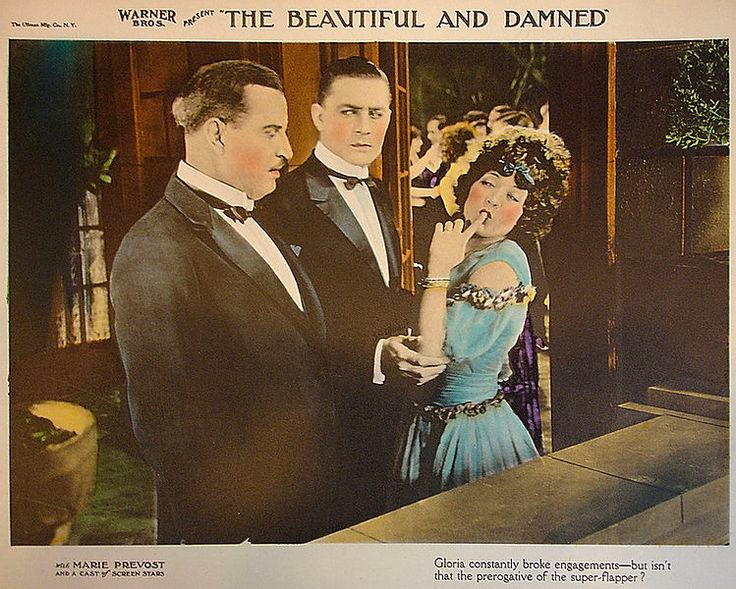The Beautiful and Damned: Fitzgerald's Second Novel in Four Songs
- Katherine Dahl
- Jan 31, 2024
- 3 min read
A few weeks ago, I wrote about The Great Gatsby; at least everyone is familiar with the Leonardo DiCaprio ‘cheers’ meme that came out of the 2013 movie, if not the actual novel. Today I wanted to return to F. Scott Fitzgerald and his second novel: The Beautiful and Damned. Initially published in 1922, the story follows the characters Anthony Patch and Gloria Gilbert, two ill-fated lovers surrounded by the gaudy, glittering society of the rich. Unemployed and surfing on his wealthy grandfather’s money with no greater ambitions than doing exactly that, Anthony hangs around with companies of varying statuses of wealth with whom he parties and gets drunk. As time passes, a clear divide grows between Anthony and this society and between him and his wife.
However, at the novel's beginning, Anthony becomes instantly infatuated with the flapper, Gloria. She is the talk of the town, so to speak, and very beautiful. Her beauty and energetic disposition lead her to be the “miss thing” of New York. Thus, “Everybody’s Talkin’ Bout Miss Thing!” by Lavay Smith & Her Red Hot Skillet Lickers (yes, that is the actual band name) is the first song to describe the effect Gloria has on Anthony and the rest of the city. She is so popular that “when she moves, everybody flips[,]” including Anthony and the other men she leads on. She instantly becomes the complete focus of his attention—even more than his slowly declining finances—in the face of these rival suitors.
Once he finally makes the move, Anthony ends up impressing Gloria enough that they marry to enjoy the high society of New York City together. They, young and beautiful and riding off of the high given by endless parties, are making the most of their “Golden Years,” like the song by David Bowie. They are both equally determined that “nothing’s gonna touch [them] in these golden years,” a sentiment confirmed in their overly lavish (and unaffordable) living. Unemployed, they live like the “nights are warm and the days are young” and will be forever; this soon proves not to be the case. Instead of enjoying endless extravagance without consequences, their money runs out; they are forced to move to smaller and smaller apartments, give up more and more luxuries, and drink more and more until Anthony is drafted into the army for WWI.
To mix in with all these troubles, Anthony and Gloria are found drunk and disgraced one night by Anthony’s grandfather, Adam Patch; it was only a matter of time before Anthony was effectively written out of his grandfather’s will. In this, he is condemned to a life of either poverty or work. As in the song “Condemnation” by Depeche Mode, Anthony feels like his (and Gloria’s) “duty was always to beauty,” that beauty is the beauty of life and affluence. After his grandfather dies, he takes the case to court to argue that the change in will was written while Adam Patch was not in his right mind. Thus, Anthony is “here on the stand with a book in [his] hand[,]” while his life gradually falls apart. The case drags out past his leaving the army and his marriage falling apart.
By the time the case is won, no love is left between Anthony and Gloria. His “ambitions [were] low” the entire time, yet it never came between them until years had passed, until Anthony is left wondering “why [...] the bedroom [is] so cold?” Therefore, the final song for The Beautiful and Damned is “Love Will Tear Us Apart” by Joy Division. The financial troubles mixed with Anthony’s unfaithfulness in the army, Gloria’s fading beauty and loss of self, and general debasement through alcoholism all rip the once-obsessed lovers apart. They soon grow dispassionate towards one another and life itself; any other emotions they once felt “won’t grow” back again. Their “respect [has run] so dry” that nothing is left, even when the case leaves them worth $30 million.
A bittersweet, or maybe even pessimistic, ending leads the entire book to have a defeated air around it. The rich affluence of the Jazz Age is memorable, yet Fitzgerald gives another definition: false, dissatisfying, and empty. The Beautiful and Damned is wonderfully poetic, in a sorrowful and almost ironic sort of way, especially considering Fitzgerald used his own marriage as inspiration. In any case, it was a good read, if not as great as Gatsby.
Runner-Ups: “World We Knew (Over and Over) by Frank Sinatra, “Tomorrow’s Gonna Be a Brighter Day” by Jim Croce, “The Masquerade is Over” by Nancy Wilson, “Maybe I Know” by Lesley Gore
_edited.png)






Comments